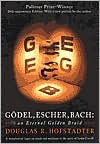| Required Texts The following texts are required; a thorough familiarity with their contents is advised:
- Hausman, Alan, Paul Tidman, and Howard Kahane. Logic and Philosophy: A Modern Introduction. Tenth Edition. Belmont CA: Wadsworth/Thompson Learning, Inc., 2006.
- Hofstadter, Douglas R. Godel, Escher, Bach: An Eternal Golden Braid. New York: Basic Books, 1999.
 
|
Recommended Texts
The following texts are recommended for those students who wish to advance their philosophical understanding or abilities:
- Bell, John L., David DeVidi, and Graham Solomon. Logical Options: An Introduction to Classical and Alternative Logics. Peterborough, Ontario: Broadview Press, 2001.
- Quine, W.V.O. Philosophy of Logic. Harvard, Harvard University Press, 1986.
- Sainsbury, Mark. Logical Forms: An Introduction to Philosophical Logic. Cambridge, MA: Basil Blackwell, Inc., 1991.
|


